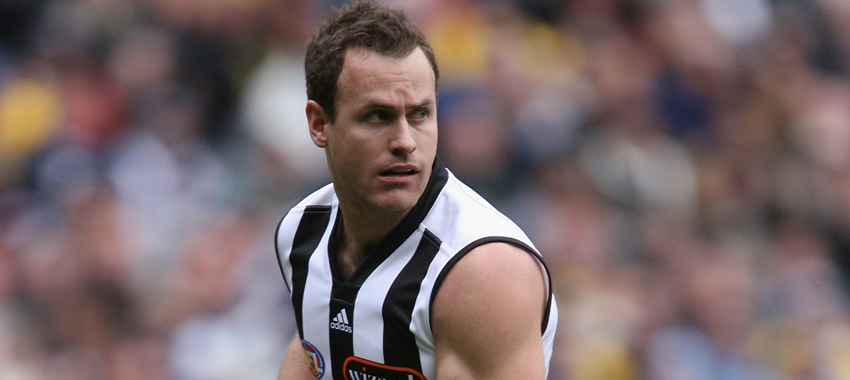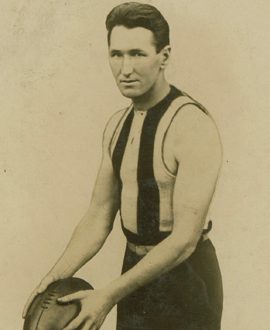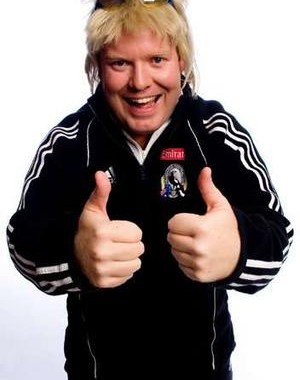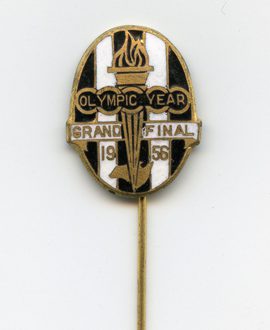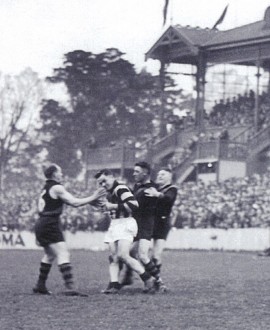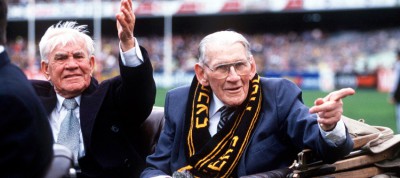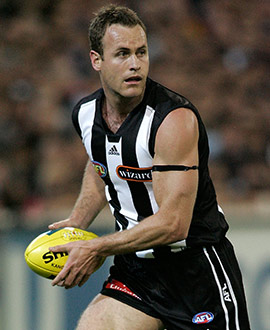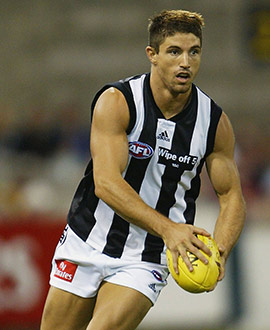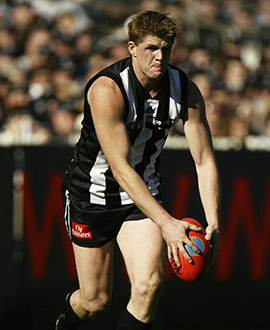By: Glenn McFarlane
Collingwood has won its fair share of one-sided contests against Fremantle since the Dockers joined the AFL in 1995.
But it is hard to think of a more comprehensive victory that the Magpies have had over the Dockers than what happened during the 2000 trade period.
As the eyes of the world were fixed on Sydney ahead of the XXVII Olympiad, Collingwood pulled off what at the time looked like a routine draft deal involving two players for pick 39 - without the need for any steak knives thrown in.
It would end up being one of the best trading coups in Collingwood's history.
Three days before Cathy Freeman lit the cauldron for the Opening Ceremony of the 2000 Olympics, the AFL's trade period barely made a ripple on the Australian sporting radar.
And if there was a blip, it was largely confined to the movement of Aaron Hamill from Carlton to St Kilda and Peter Bell's switch from North Melbourne to Fremantle.
No one really took notice of Collingwood's decision to chase two players who had fallen out of favour with Fremantle's then coach Damian Drum and the Dockers' acceptance that they were happy to take a mid-range pick as compensation.
Fremantle would use that pick on Adam McPhee, who would play two seasons with the club before moving to Essendon for seven seasons only to return for three more years at the back-end of his career with the Dockers.
One of the players who transferred to Collingwood at the time would become one of the most reliable defenders in the competition; the other would become a more than capable forward who was much loved by the Magpie faithful.
James Clement had played 84 games before his trade to Collingwood; Brodie Holland had played 36. Each would more than make their mark in black and white.
Clement made his intentions clear when he first came to Victoria - and Victoria Park.
He told the Herald Sun: "I don't think that (Damian) Drum and I saw eye to eye. A lot of guys have left (Freo) and had actually reasonable to good careers. I hope to be one of them.
"I think it could be a case of probably (some) guys don't get the best out of themselves in a two-team town where there is a lot of worshipping of footballers.
"I think I bring a bit to the (Collingwood) footy club. I have played 80-odd games with a considerable amount of experience. Half of our (Collingwood) kids have played a handful of games. I find myself in a leadership role."
The two players would become the greatest gifts Freo could ever have given the Magpies, particularly Clement, who was to win two Copeland Trophies, two All-Australian jumpers, and who would prove to be an able lieutenant to captain Nathan Buckley.
The two could hardly have been more different in on-field characteristics and off-field character, though they both came to embrace the club that chased them.
Holland was more than taken by the bright lights and the big city that the one-time kid from Tasmania came to love. He loved the media, had a stint for a period as a model and was a small forward capable of kicking multiple goals who was also later flexible enough to re-invent himself as an tagger who wasn't afraid of getting his hands dirty.
Clement was almost the antithesis. He hated hype. He fit the stereotypical understated mantra of a backman who hated fuss and preferred a low-key approach to football and life.
It's fair to say that Clement was never seduced by the "worshipping" of AFL footballers.
Collingwood was in the rebuilding stages when it went chasing a key defender and a small forward after Mick Malthouse's first season as coach. The Magpies had finished 15th in 2000, with seven wins.
For a time, Malthouse thought about trying to be reunited with then West Coast defender (and future forward) Fraser Gehrig, who wanted to return to Melbourne.
But a trade with the Eagles and their former coach wasn't going to happen.
Then Magpie recruiting chief Noel Judkins said on reflection: "We just said we really need a bloke that's six foot three, and can run and do the disciplined things, and is good overhead."
So the attention switched to Clement, who was struggling to win selection at Fremantle.
Judkins recalled: "Mick came to the club and we were talking and he said; 'What else do you reckon we want?' and we said: 'We need a six foot guy and we like James Clement'. Mick said: 'Jesus, I love James Clement.'"
Malthouse and Clement had admired long each other from afar - or least from rival WA clubs.
Clement recalled: "I got taken by Fremantle initially through their concession pick and I think, like all kids, I wanted to go to West Coast because they were a successful team.
"Since that day, Mick had always given me a courtesy call or run into me, probably once a year, and suggested I come and play for him."
Malthouse agreed: "I watched him play as a junior and even then the Eagles were keen to get him, but we weren't able to trade with Fremantle."
It seemed natural that once Malthouse had settled in Melbourne and noticed Clement was seemingly out of favour with Drum, he was always going to try and get the player he had wanted years earlier.
Even if, once Clement was at Collingwood, Drum saw it in a different light. He told one newspaper that "at the end of the day Mick got the player that he wanted and he was prepared to use any means to get him. Mick had done the right thing by his club in pursuing a player not only in contract but contracted for the following year."
Malthouse correctly pointed out that Fremantle had agreed to trade Clement to Collingwood.
Holland was thrown in as part of the deal because Judkins had recalled just how good a junior footballer he had been - arguably one of the finest of his age at 15 - and how he had once invited him to Windy Hill to try out.
Judkins said: "Brodie was someone we thought we might be able to get goalkicking out of and if he could get his fitness back and get rid of the niggling injuries, he might develop into another who could play on the ball."
It was fitting that Holland's first game in black and white came against his old side, Fremantle in 2001.
He booted three goals in the Round 2 game in a match remembered almost as much for Nathan Buckley's 46 touches - 20 of them contested - as for Collingwood's 17-point win.
Incredibly, a week later, in the Magpies' Round 3 victory over the Western Bulldogs, Clement also debuted in black and white by kicking three goals.
By Anzac Day, in Round 5, Clement "ran with" James Hird in defence for much of the first half before the Essendon star went into the middle of the ground and began to wreak havoc on the Magpies.
Clement kicked one of his most important goals in Collingwood's Round 9 win over St Kilda - a 65m bomb from inside the square - that sealed the match.
As The Age rather harshly said at the time: "It was the moment Clement moved from being the Fremantle reject Collingwood had been saddled with when it couldn't wheedle Fraser Gehrig out of the reluctant Eagles, to being an inspired choice of deep insight and wisdom."
The Magpies always believed Clement was an inspired choice, never considering him to a reject. And the same could be said for Holland.
By the end of their first season at Collingwood, the trade transaction already looked like one of genius.
Under Malthouse, Holland would become more than a handy footballer, capable of playing a few different roles. Clement would rapidly develop into one of the competition's premier defenders.
In his first six seasons at Collingwood, Clement missed only six games, and was rarely beaten deep in defence.
His consistency and his habit of winning his position, regardless of the result of the game, saw him become a star in a revamped team that would contest the 2002 and 2003 Grand Finals.
Holland missed selection in the 2002 Grand Final, but won his place back into 2003 premiership playoff.
Clement's respect within Collingwood came almost instantaneously; the respect externally took a few extra years.
He would win back-to-back Copelands - in 2004 and 2005 - as well as finishing second in 2006, and third in 2002.
Externally, he was winning acclaim, too, being named in two All-Australian teams in 2004 and 2005, and narrowly missing out on a few other occasions.
He was classy but also courageous. In one game, against his old side, in 2004, he played the last three quarters with what was a suspected fractured cheekbone.
Holland, too, made his mark, albeit not with the same impact that Clement did.
His most memorable, match-winning performance came against West Coast in 2002, when he booted 8.1 in the club's one-point win in what was Chris Judd's first game for the Eagles, and Jason Cloke's first for the Magpies.
As understated as Clement was on the field, he was an outstanding influence and inspirational on the field. He often filled in for Buckley as captain when he was injured.
And he was considered a certainty to inherit the captaincy when Buckley was set to call it quits after the 2007 season, which ended sadly with a narrow loss to Geelong in the preliminary final.
But, in keeping with his understated manner, Clement quietly decided to give the game away before Buckley would announce his decision to retire.
There was no fan-fare, no media conference and no looking back. Clement, at 31, was ready to move to the next phase of his life. As football manager Geoff Walsh said at the time: "I don't think anyone has seen it coming ... he is a terrific leader, so naturally he's leaving a hole on and off the field."
Mike Sheahan said football should have expected nothing less as "what it says is that football simply has been a phase in Clement's life, not his life itself."
At the club's best and fairest that year, Clement spoke about his "immensely enjoyable seven years." It was immensely enjoyable for Collingwood fans, too, watching him play his 146 games in the No.8 jumper.
Holland would play on for an extra season, retiring at the end of the 2008 season with 119 games for Collingwood to his credit. Unfortunately, injuries cruelled Holland's last few years at the club.
The two players traded to Collingwood for pick 39 in late 2000 would end up playing a total of 265 games in black and white - not a bad effort for guys who were dubbed “rejects” at the time of the trade.
